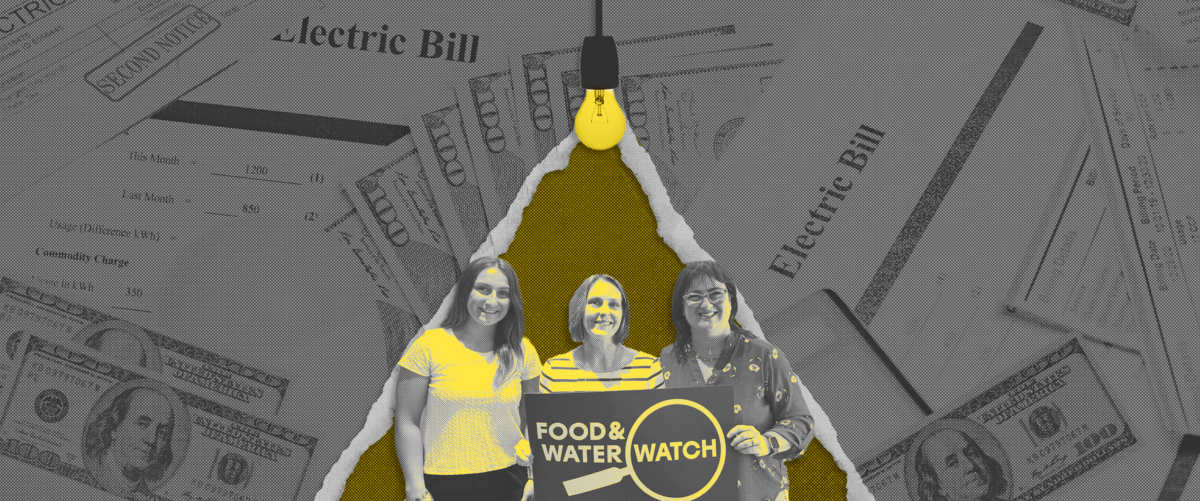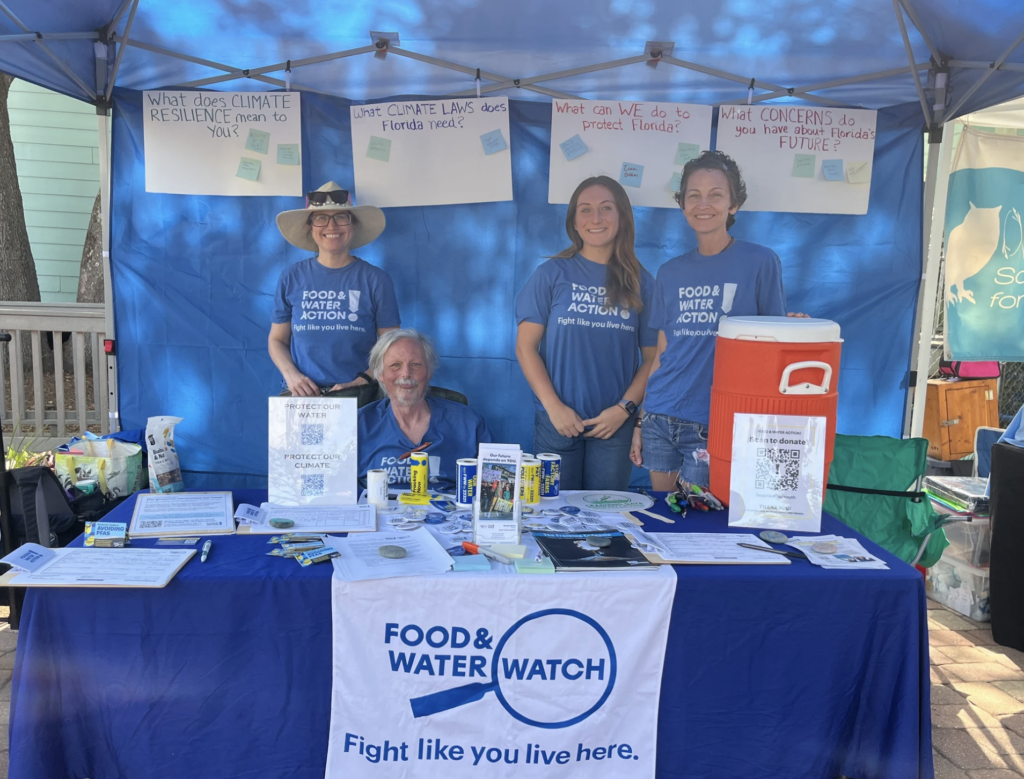A Student’s Fight Against Fossil-Fueled Rate Hikes in Florida
Published Aug 22, 2025

After moving to Florida, I found purpose organizing for affordable energy and fighting for a more resilient future in the state I now call home.
Growing up on a small farm in Wisconsin, I was surrounded by animals, open land, and an abundance of nature — an environment that shaped how I see and care for the natural world. This early connection laid the foundation for my passion for environmental and climate activism and eventually led me to volunteer and intern with Food & Water Watch.
But my path to this work hasn’t been straightforward — it’s been shaped by travels abroad and moving across the country in pursuit of connecting my passions with real-world impact. This winding journey has brought me here to Florida, fighting for affordable clean energy in my new home state.
Now more than ever, this fight matters: Florida Power & Light is proposing a historic utility rate hike at a time when Floridians are facing worsening climate disasters and higher costs of living. Our elected officials must stand up for us and ensure clean, affordable energy for our communities.
How I Became Dedicated to Environmental Activism
After high school, I postponed college by a year to instead work and travel the world. For six months, I backpacked through seventeen countries. Throughout my journey, I explored incredible places, met new people, immersed myself in different cultures, and opened my eyes to new ways of life.
While driving to the beach in Nicaragua, I passed an open landfill overflowing with trash. It struck me that while I was fortunate enough to explore the beauty of another country, the realities of climate change and pollution — entirely human-caused — were impossible to ignore.
That moment deepened my understanding that environmental issues affect us all, and that the most vulnerable communities are often impacted the most.
When I returned home, I loaded up the rest of my belongings and moved cross-country to start college in Florida, packing an even stronger commitment to protecting the environment and fighting for a just, livable future for everyone. With its unique ecosystems and vulnerability to climate-related impacts, I knew Florida was the right place to turn my passion into meaningful action.
That opportunity came when I found Food & Water Watch’s utility rate hike campaign in Hillsborough County.
Joining the Fight for Affordable, Clean Energy in Florida
When I arrived at the University of South Florida, I spent my first semester searching for clubs and organizations that offered meaningful opportunities in environmental activism. However, I struggled to find a space where I felt I could make a tangible difference in the community.
Then, I came across a Letter to the Editor training hosted by Food & Water Watch. The training introduced me to Food & Water Watch’s work fighting fossil-fueled rate hikes, showing me the connection between rising electricity bills and our continued dependence on fossil fuels.
Last year, we fought Tampa Electric’s request to charge customers more to build more fossil fuel infrastructure. More recently, Florida Power & Light requested what would be the largest rate increase in U.S. history, totaling nearly $10 billion. Fifty cents of every dollar they’re requesting is for profits to shareholders.
These rate hikes allow utilities to pass the costs of fuel, pipelines, and power plants directly onto customers. This gives them every incentive to keep investing in dirty gas infrastructure, knowing the public will foot the bill.
Fossil Fuels Are Fueling Stronger Storms — and the Rising Bills that Follow
The same fossil fuels that are influencing utility rate increases are driving more frequent and severe weather events. And expanding dirty infrastructure directly contributes to climate change and more devastating hurricanes.
Last year, Florida communities faced two back-to-back hurricanes that ripped through the state’s west coast, causing severe flooding and mass power outages. The aftermath resulted in tens of thousands of homes destroyed or damaged and billions of dollars in storm repairs.
As a recent transplant from Wisconsin, this was my first time experiencing a hurricane, let alone two in a row. I saw firsthand the consequences of fossil-fuel driven climate change and the vulnerability of Florida communities to increasingly intense storms. These same communities are still recovering almost a year later.
Yet, in the midst of this devastation, utility companies continued to raise rates, charging recovering Florida families for the utility’s storm costs. This places an even greater burden on communities already struggling with rising costs and storm recovery.
It’s Time to Put People Over Profits in Florida’s Energy Decisions
These profit-driven rate hikes aren’t inevitable. The state Public Service Commission (PSC) has the power to reject them, but it has rubber-stamped some of the highest electricity rate hikes in the United States.
Our leaders can and should change this. This year, state lawmakers must step up and sponsor legislation for PSC reform that addresses continued reliance on fossil fuels and the lack of accountability in its decision-making. It’s time to prioritize the needs of Florida families, not powerful utility companies.
To do that, lawmakers should pass a bill to make utilities share in the cost of fuel; link returns and profit to performance on energy efficiency standards; and strengthen oversight of PSC decisions and how utilities spend the funds we pay them through our electric bills.
By supporting such legislation, elected leaders would help protect our seniors, small businesses, and working-class families from rising costs and fossil fuel-driven climate disasters. This isn’t a political issue — it’s a Florida issue. Every Florida lawmaker should champion affordability and storm resiliency.
Join Me in Fighting for a Livable Future, in Florida and Beyond!
Once I learned about Food & Water Watch’s efforts against rate hikes, I started volunteering. I helped with phone banking and attended county commission meetings, urging local elected officials to oppose the TECO rate hike and support affordable energy solutions.

Then, as an intern, I helped to draft an Affordable Energy & Climate Plan for Hillsborough County. I also led phone banking and canvassing efforts, speaking directly with community members. Through these conversations, I saw just how deeply and widely felt utility rate hikes are — affecting seniors, families, and small businesses alike.
This experience has shown me the far-reaching impact of our work and how it’s contributing to a more resilient, equitable future in a place I now call home. All this has deepened my passion for grassroots activism, inspiring me to shift my environmental science concentration from research to policy so I can strengthen my knowledge in community-led climate solutions.
The cost of energy in Florida keeps rising, and last year’s hurricanes won’t be the last. But together, we can fight for an affordable, climate-resilient future.
Moreover, these challenges aren’t unique to this state. Rising costs and climate disasters are affecting communities across the country. In fact, even in my home state of Wisconsin, we experienced unprecedented flooding this summer. Now more than ever, we must fight for affordable energy, climate justice, and resilient communities for the future generations to come.
Florida is now my home, and I believe in a future where we protect people and the planet — not corporate profits. If you believe the same, tell your legislators: “We need you to fight for affordable, reliable energy and pass legislation to hold utilities and the PSC accountable.”
Write to your legislators: “We want affordable energy, and that means PSC reform now!”
Isabella Moeller studies Environmental Science & Policy at the University of South Florida and serves as an intern with Food & Water Watch. She is dedicated to sustainability, community organizing, and advancing environmental justice through advocacy.
Enjoyed this article?
Sign up for updates.
TO TOP


